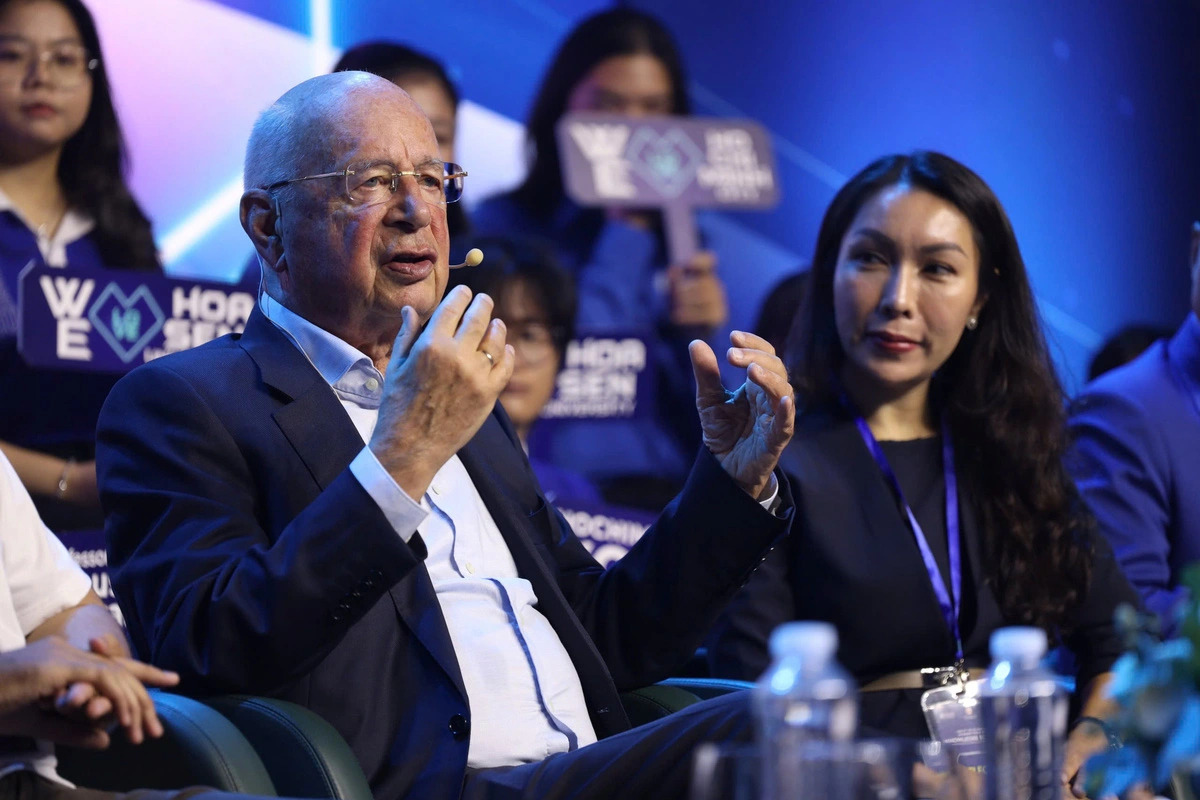Vietnam’s economy may reach a value of US$2 trillion by 2050, allowing the country to become an economic power in 20-30 years, according to Prof. Klaus Schwab, founder and executive chairman of the World Economic Forum (WEF).
The WEF founder released this projection while attending the ‘Knowledge Economy - The Foundation for a Prosperous Future and Youth Action’ discussion in Ho Chi Minh City on Sunday, as part of his business trip to the southern economic hub.
The event gathered 1,200 participants from agencies, businesses, startups, and outstanding young citizens.
It was part of the fifth Ho Chi Minh City Economic Forum, which was held by the municipal Department of External Relations and Hoa Sen University on October 5-6.
In his opening remarks, Phan Van Mai, chairman of the Ho Chi Minh City administration, noted that the theme is highly relevant as the city’s economy is transitioning toward a knowledge-based model that prioritizes the development of science, technology, and creative innovation.
He lauded the pioneer role of the youth in building the knowledge-based economy.
“More than anyone else, young people are the core force that plays a decisive role in forming and developing the knowledge-based economy in Vietnam," Mai said.
Addressing the audience, Prof. Schwab said that the world is changing rapidly, while globalization and Industry 4.0 are taking place to a greater degree, requiring every country to constantly develop and stay ahead of trends.
He described Vietnam as a country with a population of 100 million, an economy projected to reach $430 billion this year, a GDP growth rate of six to seven percent, and a median age just over 30.
He highlighted Vietnam's potential to achieve a $2-trillion GDP by 2050.
Prof. Schwab was cited by Thanh Nien (Young People) newspaper as saying that Vietnam will certainly become one of the world’s 40 leading economic powers in 20-30 years and amaze the world with its renovation capability.
The WEF leader assessed Vietnam's economic growth as a dependent on industries and exports, especially electronics and goods manufacturing, believing its economic and social structure will change significantly and transition into the era of intelligence by 2050.
The intelligence age will bring both opportunities and challenges to Vietnam, Prof. Schwab said, pointing out four prominent development trends, namely AI and automation in manufacturing, e-commerce and digital services, digital infrastructure within a smart city, and sustainable development and green technology.
Vietnam has made significant progress in poverty elimination and social welfare improvement, but the digital transformation process may pose a risk of increasing inequality if not carefully managed.
In the education sector alone, the WEF founder deemed Vietnam's system a long-standing pillar of the country's success, especially in science, technology, engineering, and mathematics.
Schwab advised if Vietnam wants to be an active participant in the era of intelligence, it needs to continue investing in its education system and ensuring students are equipped with the skills of the future, including digital literacy and critical and creative thinking.
The WEF leader highlighted that rapid advancements in technology and intelligence will open up opportunities for Vietnamese youth, particularly in areas like AI, blockchains, the Internet of Things (IoT), and biotechnology, fostering unprecedented innovation and entrepreneurship.
He affirmed that the world is about to face changes at a dizzying pace, and one of the most important qualities that young people globally need to develop is a commitment to lifelong learning.
Today's jobs may not exist tomorrow, Schwab told the audience, adding that the skills students are learning at school today may need to be updated in just a few years, so a continuous learning process is required.
The WEF chairman emphasized that people who are passionate and ready to adapt, develop, and learn new skills can succeed. Otherwise, they will fail.
He pointed out that one of the most interesting and difficult challenges that young people will face is ensuring the technologies they develop are used ethically and responsibly.
Prof. Schwab emphasized that leadership skills are essential to navigating challenges and seizing opportunities.
He identified five key elements: a soul for purpose, a brain for knowledge, a heart for passion and compassion, muscles for action, and a nervous system for resilience.
When these elements work in harmony, he concluded, the next generation of Vietnamese will lead not only their own lives but also society, guiding Vietnam into a future of creativity, equality, and sustainability.
Like us on Facebook or follow us on Twitter to get the latest news about Vietnam!



















































